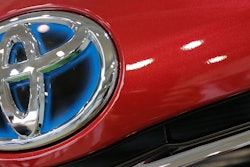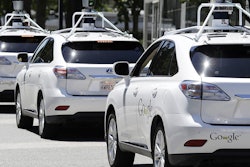BUSINESS-01
Gurria of OECD; Panama Should Increase Information-Sharing says Gurria;
Governments Improving Tax Avoidance Crackdowns; Former BP CEO says Firms
Must Engage with Society; Leaked Documents Said to Expose Tax Havens; Leak
Allegedly Reveals Elite Officials' Secret Assets; Eleven Million Documents
Leaked From Panama Law Firm. Aired 4-5p ET - Part 2>
his wife hid assets as part of the tax havens in Panama. The German
newspaper Suddeutsche Zeitung leaked the documents saying they are doing it
as part of the public interest. The newspaper said they do not know
whether the material was stolen. It's about potential abuse and in most
cases about deliberate ways to avoid the obligation of doing their fair
share, Angel Gurria of OCDE. Lord John Browne, author of "Connect" found
in a study that companies engaged with society showed 20 percent more
profits in ten years. When Volkswagen was caught with their pollution
control issue their stock dropped 30 percent. Today it's easy to steal
information you just need a portable hard drive and access to a computer.
The debate about security and privacy would have never happened if Snowden
hadn't leaked the documents.>
(BEGIN VIDEOTAPE)
WOLFGANG KRACH, EDITOR AND CHIEF SUDDEUTSCHE ZEITUNG (via telephone): When the information the glut of information started -- we were just -- I wouldn't say shocked but it was an enormous amount of information. So we saw this enormous amount of data. And we saw in the very beginning that we would never be able to do all this research just by ourselves. So this was of two reasons. Because the first one was this huge data -- amount of data. The second reason was we saw in the very beginning that it's concerning dozens of countries all over the world. So we knew we would need any international form of cooperation because we would never be able to do all the research in all these places all over the world by ourselves.
[16:35:10] QUEST: The treasure trove of information, I mean, I do need to put it to you from the point of view of the law company and the law firm involved, they say quite clearly this is stolen material. This is material that belonged to them that has been stolen by somebody. Even allowing for journalistic investigations, how do you answer that?
KRACH: First of all, we do not know whether this material is stolen. We don't have any knowledge about that. So I can't confirm because we don't know. This is the first thing. The second one, of course in the history of investigation of investigative journalism, there is a lot of material in general that was stolen and aware -- take the Snowden case, for example. Of course Snowden took this material illegally from the NSA, but I would say this, nevertheless, it was the right thing the Guardian and others published this material, because this was in the real public interest. I think this is for us as journalists, this is the decisive, the crucial point is the material we have of public interest and this public interest has to justify the publication.
QUEST: This is a fascinating part, Wolfgang, because when I look at the information as much as one can, 11 million documents. I'm sure you looked at most of them at some point. But when I look at this, it tells the -- sort of the raising of the eyebrows of people in power, governments and transparency organizations. They say, yes, this is what we always told you was going on. We've all known the shell companies, these offshore companies have been used by rich powerful people to hide assets and avoid taxation. So I ask you, Wolfgang, what do you hope is now done with this information?
KRACH: This is the first time that we can really prove these things. We can prove that people or companies avoid taxes. We can prove many more things. I would say my personal hope or our hope is that governments all over the world, they really start to cooperate. In fact, not only start a corporation by talking, but they change things, they make laws to change this way of tax avoiding and of other criminal actions.
(END VIDEOTAPE)
QUEST: The editor of Suddeutsche Zeitung says they'll have more revelations in tomorrow's newspaper looking at the relationship between German banks and Mossack Fonseca in Panama. The Panama Papers have provided journalists have a massive amount of data going back nearly forty years. If you look at the data, according to the leaks, the number of offshore companies peaked in 2005. It pretty much stays quite steady. That's about 13,000 incorporated. The practice becomes less popular both as the financial crisis hits in 2008 and 2009. But also of course the g 20 in its treaty agreement of both London and elsewhere. They have basically, the G-20 and its treaty agreement of both London and us. The have basically the G-20 agreement to restrict tax avoidance, means it shrunk all the way through to as you can see the numbers falling off. Last year, just over 4,000 offshore companies were opened. The OECD has been on the frontline against the fight against tax avoidance and measures used as offshore companies. The OECD Secretary-General, Angel Gurria, joined me earlier. I put it to him that the Panama Papers appeared to show widespread abuse.
(BEGIN VIDEOTAPE)
ANGEL GURRIA, OECD SECRETARY-GENERAL: It's not about potential abuse. Most of these cases are about deliberate ways in which to avoid the obligation of doing their fair share in terms of paying taxes. In some cases that have been identified so far it has to do with efforts about moneys that were taken away from countries in order to, again, avoid scrutiny. So what has now been shown is the extent and the importance and the size of these flows. Unfortunately, it also shows that it's a shrinking group of institutions and a shrinking group of places that are still practicing this because of both the automatic exchange of information and because of the base erosion and profit shifting policies we put in place.
[16:40:21] QUEST: Panama may have been also the headquarters of this law firm, but there are many other -- all the usual suspects in terms of tax havens are in the list. Yes, it has fallen off quite considerably since 2009, 2010. But they're all still there and they're all still up to it, aren't they?
GURRIA: No, Richard, 130 jurisdictions, and that is practically every single financial center, have already accepted and are practicing exchange of information on request and most of them have committed to do exchange of information automatically. Panama has not joined them. So Panama is one of a few, a handful of countries that have observed this behavior and hopefully now that this has become so evident, they will join the international community in becoming more transparent and avoiding the, you know, being a place where people can -- well, effectively move away from the tax man.
The idea that in 2017, 2018, if you create an account, it's going to be automatically reported to your own authorities in the country of origin of the citizen that created the account has already cost upwards of 50 billion euros to be delivered on a voluntary disclosure basis to the authorities of the countries. Because they know there's going to be nowhere to hide.
QUEST: Are you concerned, though, a lot of the structured that have been revealed, they're exceptionally complicated? The whole structure of setting up companies, hiding behind them, shifting assets. Again, not only for tax evasion purposes, but for the purposes potentially of looting national treasuries, or avoiding regulation. It's all still there and we're now getting a better idea of just how widespread it is.
GURRIA: Indeed, Richard, this is a question of beneficial ownership. Where this, you know, in many jurisdictions you basically cannot know who is the actual owner of the shares of the companies. Again, there's a lot of progress here. There's a whole new awareness of the fact that in a modern country of the 21st century you cannot have governments that do not know who owned the companies for the purposes you mention, and also simply for the first element of discussion that we had, which is about paying your fair share of taxes.
(END VIDEOTAPE)
QUEST: Gurria of the OCDE. There are people who hid their money and companies that help them do it. My next guest, Lord John Browne, says it's time for businesses to engage with society. This is his new book. Lord Browne is going to be joining me in the C-suite to discuss this and other issues. Come with me, your lordship.
(COMMERCIAL BREAK)
QUEST: A leak of the so-called Panama Papers is raising questions about corporate transparency and responsibility. Lord John Brown led BP. In his new book "Connect," Lord Browne argues that companies engaged with society are more successful. We'll deal with that and the success. You weren't surprised when you heard the news of the Panama Papers, the size and scale of what's going on, were you?
JOHN BROWNE, FORMER CEO OF BP, AUTHOR "CONNECT": Well, here's another event, which has happened in the past and will doubtless happen again in the future. Not a surprise that way. The details I'm not on top of. It's certainly something which is here again I think pushed corporations into a bad place. The rich doing good things for the rich and not for the poor. And doing it at the expense of everybody.
QUEST: Because that's what will come out here, and again not the details we don't know. But never mind the law firm per se, but it's the intermediaries, all the banks around the world. Big names, household names within the financial community that we're using. What does it tell us about companies?
BROWNE: Well, it again is a repeat of history. Hegel said if there's one thing we learn from history, is we don't learn from history. But if you go back in the book, I go back to China before the Common Era. It's repeated again and again where people take advantage of society, if they do not engage with them in the right way, engage radically. They have to remember their purpose and they have to be able to engage on the basis in which society wants them to engage. Their agenda, not a corporate agenda.
QUEST: Right, but this goes to the heart of the debate about this engagement with society and whether or not it's a carrot or a stick.
BROWNE: Well, it clearly has to be both.
QUEST: Does the carrot really work?
BROWNE: It does. If you look at the history of companies who have done this well, they've made more money. They've actually made more money. Our studies show 20 percent more profits over ten years. Our study also shows 30 percent less value at risk. Volkswagen, when they were caught out with their pollution control issue, their stock price dropped by 30 percent. Exactly what we predicted in the book. So it happens again and again. So the carrot is getting it right. The stick is if you get it wrong, look what happens to you.
QUEST: You talk in the book, you mention Hank Paulson and the way in which he arrived at the treasury, and when he saw just what a mess that was. And you also talk about Paul Pullman of Unilever. If there's ever an example of a chief exec who is using his company to engage with society it's Unilever.
BROWNE: Exactly, he's changed the strategy so the strategy isn't just about products and manufacturing, it's the strategy -- contains the strategies for society as a whole and that first and center --
QUEST: but that nebulous.
BROWNE: No, it's not. It's actually making sure you have direct measured engagement with communities, with NGOs, with regulators, with everybody who's affected.
QUEST: How do you ensure that happens? And A it's not lip service, but B that companies do actually do it? Saying to somebody your share price will fall if you don't. Means there's going to be -- you'll suffer if you don't. But there's got to be an incident before you suffer, with the Volkswagen, or with the BP. There's got to be an incident before you suffer.
BROWNE: So our studies show that CEOs get this.
QUEST: Do they?
BROWNE: They do. We surveyed thousands of them. And they all get it, but they have to do something. But only 30 percent think they do it effectively. And they don't know and the rest don't know how to do it. I think some of this is about pushing from the investor side a clear exposition of strategies that include engagement with society. Not corporate social responsibility, that's something which has actually allowed people to sort of just get away from the main topic.
QUEST: Do you still -- but finally, on the Panama Papers -- do you still have the capacity, John, to be shocked when you hear something like this?
BROWNE: It's a bad thing to say that I've been in business 50 years, so not too much shocks me.
[16:50:00] QUEST: Thank you very much indeed.
BROWNE: Thank you.
QUEST: We'll talk about the other side to this Panama Papers. Because although the details have been leaked, somebody had to steal them before they could be leaked. The theft of the documents in a moment.
(COMMERCIAL BREAK)
QUEST: The firm, the legal heart of the Panama Papers, says it's a leak and it wants justice on the theft of so many documents. In the statement, Mossack Fonseca says, "Obviously no one likes to have their property stolen, and we intend to do whatever we can to ensure the guilty parties are brought to justice." Jose Pagliery, he joins me now. Good to see you sir. Eleven million documents are taken from them. And with you now I want to explore this question of cybersecurity. This was theft.
JOSE PAGLIERY, CNN MONEY CORRESPONDENT: Yes, absolutely was, as WikiLeaks was, as Snowden's leaks were. And what we need to realize is that this is going to happen a lot more often. Because it's easy. Right. In this case, it was 11.5 million documents. You would need a truck, right, 20 years ago, you'd need a truck to come in, be backing up and take all these documents. Now, I plug in this hard drive to that computer and I walk out. No one's going to ask me if I'm walking out with this, right. That's what companies are dealing with today.
QUEST: How much can I get on those hard drives?
PAGLIERY: On these two, everything we're talking about 11.5 million documents, two terabytes worth, yes. The thing is we live in a new world where it's easier to do that. And that's physically in person. If we're talking about something like Sony where all those e-mails were taken, they were taken from abroad. Someone poked into their computer network and pulled these documents out.
QUEST: All right let's just for argument sakes, say I take my computer and I take your thing and I plug the two together.
PAGLIERY: Plug the hard drive in.
QUEST: Surely the system, the computer system of the company involved should be marginally sophisticated to say, hang on, somebody's try to download the entire archives of the entire company.
PAGLIERY: It doesn't take a lot of sophistication to do that. But it's Sony of all companies, Sony wasn't looking to see if its movies were being pulled from its systems outside the company. Much less inside the company. And so companies haven't matured yet. Expect more of this transparency activism because it's easy right now. Cybersecurity's hard. It takes money to install programs that watch for this sort of thing. It takes money to hire experts who guard your network. But even then, everyone in this industry says the same thing it it's only a matter of time before a hacker is going to get in. Or before an employee on the inside retrieves the data.
QUEST: We're talking about 11 million document going back 40 years, which suggests -- I mean, half of this stuff was archived. Look I can't even get some of my emails from three months ago from the Turner Broadcasting System.
PAGLIERY: Yes, whoever -- saying, so whoever did this is surely saying thank you for digitizing it so I can just walk out with this little thing. This little thing. You stick it in your pocket, no one will know.
QUEST: We can argue over this for a while, but you know, the company says it's theft, and now we come on to the question of which do the ends justify the means?
PAGLIERY: This is transparency activism. We saw it with WikiLeaks. You'll a lot of people say that WikiLeaks was justified, because now we knew what the government was engaged in. Snowden as well. President Obama says we need to have an open debate about security, about privacy.
[16:55:00] That debate would have never happened were it not for Snowden coming out with these documents. So the same thing's going to happen here. Was this illegal? Probably. But it's going to spark a conversation that we weren't having.
QUEST: But it also raises the question of the person who did it having access and a certain level of sophistication, because you do have to have - - I wouldn't even know how to, frankly -- I can't even download emails --
PAGLIERY: It's not that hard but --
QUEST: But the point I'm saying is and this question everybody becomes their own judge and jury. I think that the company's up to no good. Therefore, I'm going to steal their entire archives and I'm going to leak it.
PAGLIERY: Yes. It's inevitable. Because it's not just that you need -- it's not just that you need the skills. If you have is 1000 bucks, you can pay someone. You can pay a hacker to do it for you. I mean, someone else has the skills. You can just outsource it.
QUEST: Thank you very much. You won't be needing these.
PAGLIERY: All my secrets are on there.
QUEST: It will be a short day indeed for you. Thank you, good to see you.
Some breaking news just in to CNN. Thomas Staggs the chief operating officer and number two executive at Disney is to step down from his post. He was the likely successor to the Chief Exec, Box Iger. We'll talk about that. We'll have a Profitable Moment after the break.
(COMMERCIAL BREAK)
Tonight's Profitable Moment. The release of the Panama Papers has told most of us pretty much nothing we didn't already know, that the abuse of offshore companies is widespread, that it's used for money laundering, shielding assets from spouses and creditors and of course for tax evasion.
[17:00:06] But there is of course another side of this. This is a legitimate use for offshore companies, shareholders, bearer of bonds and the like. The problem is deciphering the good from the bad. And until now, that's been pretty difficult. What we have seen with the panama papers is the extent and scale to which it's being used. And it will not be good enough for people like the Icelandic Prime Minister to simply say I broke no laws or I did nothing wrong. Because there's stench of hypocrisy, a whiff of what you were doing it for that leads one to say something smells bad. And that's perhaps the advantage of what we've heard and will hear from the Panama Papers.
That's QUEST MEANS BUSINESS for tonight. I've Richard Quest in New York. Whatever you're up to in the hours ahead, I hope it's profitable. We'll do it again tomorrow.
END
(Copy: Content and programming copyright 2016 Cable News Network, Inc. ALL RIGHTS RESERVED. Copyright 2016 CQ-Roll Call, Inc. All materials herein are protected by United States copyright law and may not be reproduced, distributed, transmitted, displayed, published or broadcast without the prior written permission of CQ-Roll Call. You may not alter or remove any trademark, copyright or other notice from copies of the content.)






















